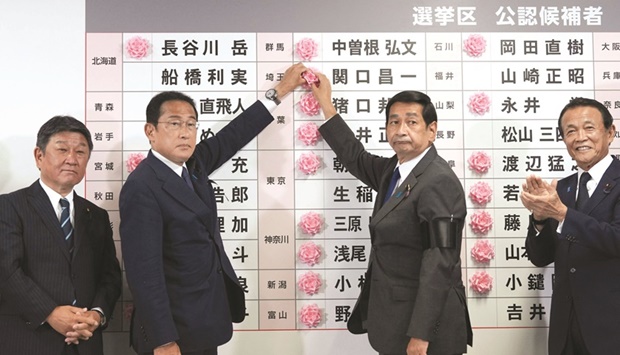Japan’s conservative coalition government was projected to increase its majority in the upper house of parliament in an election yesterday, two days after the assassination of dominant politician and power broker Shinzo Abe.
Abe, Japan’s longest-serving modern leader, was gunned down on Friday during a campaign speech in the western city of Nara in a killing that stunned a country where political violence and gun crime are rare.
Prime Minister Fumio Kishida’s Liberal Democratic Party (LDP), of which Abe remained an influential lawmaker, and its junior partner Komeito were on track to win 69 to 83 of the 125 seats contested in the chamber, from 69 previously, according to an exit poll by public broadcaster NHK.
Elections for parliament’s less powerful upper house are typically a referendum on the sitting government.
Change of government was not at stake, as that is determined by the lower house.
But the strong showing could help Kishida consolidate his rule as he looks to steer Japan’s recovery from the Covid-19 pandemic, keep a lid on rising consumer prices, and bolster defence at a time of tension with its powerful neighbour China.
Final results are due today.
“It’s significant we were able to pull this election together at a time violence was shaking the foundations of the election,” Kishida, an Abe protege, said after the exit poll. “Right now, as we face issues including the coronavirus, Ukraine, and inflation, solidarity within the government and coalition parties is vital,” he added.
The party held a moment of silence for Abe at its Tokyo headquarters as members waited for results to come in.
The LDP was projected to win as many as 69 seats, according to the exit poll, which would give it a majority even without Komeito. Its gains might allow Kishida to revise Japan’s pacifist constitution, a dream Abe never achieved.
Parties open to revising the constitution were projected to maintain their two-thirds majority in the upper house.
Kishida may move cautiously on constitutional change, but the apparent victory looked set to pave the way for more defence spending, a key LDP election promise, said Robert Ward of the International Institute of Strategic Studies.
Kishida “now has a green light for this”, Ward said.
Asked about constitutional revision yesterday evening, Kishida said he would focus on putting together a bill to be discussed in parliament.
People close to Kishida have said his team also wants to gradually phase out “Abenomics”, Japan’s signature economic policy of government spending and monetary stimulus named after the ex-premier who started the experiment nearly a decade ago.
Kishida may now have the political capital to change course, analysts said.

Japan’s Prime Minister and the President of the Liberal Democratic Party (LDP) Fumio Kishida (second left) places a red paper rose on a LDP candidate’s name to indicate the victory in the upper house election, along with his party executives at the party’s headquarters in Tokyo, yesterday.
